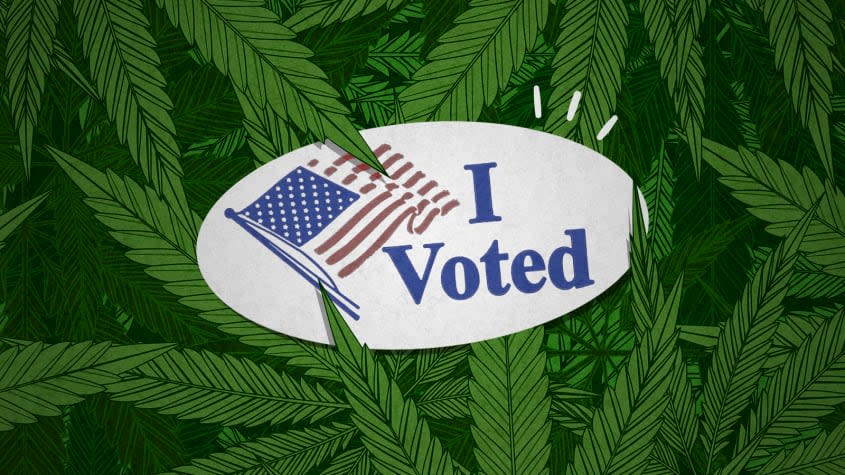What did voters decide about legal marijuana ballot measures in the midterms?

- Oops!Something went wrong.Please try again later.
Last month, President Biden announced that he would be pardoning thousands of Americans previously convicted of simple marijuana possession charges. While he stopped short of decriminalizing marijuana like he once promised, he encouraged state officials to follow his lead. The timing of his announcement caused a stir, leaving some to speculate about how this could affect the midterm elections.
On Election Day, several states put one slice of this question to the test by including measures to legalize recreational marijuana on the ballot, and early results suggest that support for legalizing marijuana might be growing.
Here's what you need to know about recreational marijuana ballot measures and what the outcome means for the future of decriminalization.
Which states had recreational marijuana referendums on the ballot?
In the midterm elections, five states included proposals to legalize recreational marijuana use for adults on their ballots. Voters in Arkansas, Maryland, Missouri, North Dakota, and South Dakota had the opportunity to vote on whether recreational marijuana use would be allowed in their states. All five states already have legal medical marijuana programs, and four of them are known as GOP strongholds. Maryland is the only state that did not vote for former President Donald Trump in 2020.
Maryland: Question 4
Maryland voters were tasked with deciding if possessing and using cannabis would become legal for adult users aged 21 and up. If the measure passed, it would go into effect in July 2023. This amendment would allow possession of up to 1.5 ounces or two plants. It also stated that those previously convicted of possession and intent to distribute could apply to have their records expunged.
Missouri: Constitutional Amendment 3
Missouri voters were posed with the question of legalizing the possession and use of marijuana for people 21 and older. The amendment would allow people to possess up to three ounces and allow people with non-violent marijuana-related convictions to petition for release or parole and probation. They would also be able to apply for record expungement.
North Dakota: Measure 2
Similarly, North Dakota ballots proposed legalizing the possession and use of cannabis for adults aged 21 and older. The measure sought to allow people to possess up to an ounce of marijuana in "various forms." It also stipulated that all marijuana be screened "for the potency of products and the presence of pesticides" and subject to random inspections.
Arkansas: Issue 4
In Arkansas, voters had to decide whether to legalize possessing and using cannabis for people 21 and over. The bill would also authorize the commercial sale of cannabis throughout the state. The bill proposed legalizing the possession of up to one ounce of cannabis and using portions of tax revenue from marijuana sales to contribute to law enforcement funding.
South Dakota: Measure 27
The possession and use of marijuana would become legal for people 21 and older. The proposed ballot measure would legalize possession of up to an ounce, as well as the possession of marijuana paraphernalia.
What was the outcome of the measures after Election Day?
Of the five states that had legalized recreational marijuana on their ballots, two of the states passed the measures, and two voted against them.
On Election Day, Maryland and Missouri voters approved the ballot proposals to legalize recreational marijuana, while voters in Arkansas and North Dakota voted to block the passage of their recreational marijuana referendums, The Associated Press reports. As of Wednesday morning, the vote in South Dakota was too close to call.
What do the results mean for the future of cannabis legalization?
For some cannabis advocates, the mixed results are an outcome that may indicate growing support for decriminalizing marijuana that goes beyond party lines. Maryland typically leans toward Democrats, while Missouri was on the list of states that elected Trump in 2020. John Payne, leader of the Missouri campaign to legalize marijuana, believes this signals that the issue has support on both sides of the political spectrum.
"It just shows that this is not a partisan issue," Payne said. "This is something that transcends partisan divides."
Some advocates believe the results will signal to lawmakers in the Capitol that pro-legalization support is growing in the nation, per AP.
"A growing number of voters recognize that cannabis policy reform is in the best interest of public health and safety, criminal justice reform, social equity, and personal freedom," Toi Hutchinson, president and CEO of the Marijuana Policy Project said in a statement. "State-level legalization victories are what's necessary to move the needle forward at the federal level."
The results bring the total number of states with legal recreational marijuana use to 21. How the opposition will respond to the successful legalization measures this year remains to be seen. A measure for recreational marijuana legalization passed in South Dakota in 2020, but the outcome was eventually reversed by state courts, per CNN.
Critics in Missouri say they have plans to attempt to limit the extent of the state's implementation of its legalization plan. One path to inhibiting the spread of legalization is working with cities and towns to disallow dispensaries in their areas.
Kevin Sabet, president of the anti-legalization group SAM Action, says, "The devil is in the details, and we will remain actively involved in Missouri implementation because we don't need another Big Tobacco industry harming kids in Missouri."
You may also like
Russian uproar over reported mass troop casualties in disastrous battle gets rare official response
TV pundits, election analysts declare Trump 'the biggest loser' of the 2022 midterms

